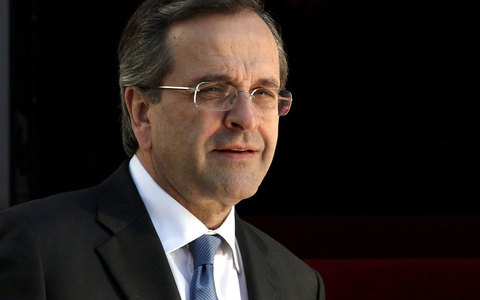Wall Street Journal
BERLIN—Greek Prime Minister Antonis Samaras plans to undertake a delicate diplomatic mission on Sunday—to Bavaria. The southern German province has been a hotbed of opposition to extending Greece more time and money to overcome its debt troubles. Hoping to convince Bavaria's powerful conservative political establishment that saving Greece is worth the money, Mr. Samaras and Greece's finance minister are scheduled to have dinner with Bavarian Premier Horst Seehofer. Mr. Samaras and Mr. Seehofer, who also heads the Christian Social Union, the Bavarian sister-party to German Chancellor Angela Merkel's Christian Democrats, will "exchange political views," according to the Bavarian state government.
The visit comes just a week after Greece's public creditors agreed to extend billions in additional financing to Athens and readied nearly €44 billion ($57 billion) in aid to keep the struggling nation from insolvency. But as planned cuts in public spending begin to bite, Mr. Samaras and his government will likely need more allies in Germany, Greece's most influential creditor. Mr. Seehofer and leaders of his party—some of whom also will attend the dinner—have been criticized for worsening often frayed relations between the two countries and undermining the German chancellor's efforts to win conservative backing for aid to Greece. But Mr. Seehofer lately has adopted a more conciliatory tone on Greece—particularly since Angela Merkel visited Athens in October to signal her support for the Greek government—praising Ms. Merkel's approach to the debt crisis and ruling out an immediate euro exit for Greece as long as it sticks to its commitments. This week, he promised his party would be like a "purring little cat" in cooperation with Ms. Merkel's efforts.
That represents a big change from last summer, when CSU party leaders made several provocative statements on Greece, winning approval from many Bavarian voters, but frustrating German political leaders across the political spectrum. "That others want our money without at the same time giving much in return is deeply human, but it's not a solution to the problems," Mr. Seehofer told the German magazine Stern shortly after Mr. Samaras took office. Markus Söder, the Bavarian state finance minister has compared helping Greece to "watering flowers in a desert." "Athens must stand as an example that this euro zone can also show teeth," he told the tabloid Bild am Sonntag in August. "The Germans can no longer be the paymasters for Greece."
Alexander Dobrindt, a top CSU official and parliamentarian predicted in August that Greece would leave the euro zone next year. Yet, last week, Mr. Dobrindt voted in the German parliament in favor of extending additional financing to Greece, and later said Greece should wisely use the time the new measures buy. CSU parliamentarians in the German Bundestag last week voted overwhelmingly in favor of extending the additional financing to Greece. Of 44 parliamentarians, 40 voted for the aid measures. The Greek and Bavarian sides began discussing the possibility of a visit in October, and Mr. Seehofer later formally invited the Greek leader. The politicians will dine on perch, Bavarian duck—and for dessert, they will have Bavarian apple strudel with frozen Greek yogurt.
Though Greece appears to have secured the financing it needs to stay in the euro zone for now following last week's agreement by its public creditors to provide additional financing, the visit by Mr. Samaras indicates the importance the Greek government is placing on convincing not only Greeks at home, but also skeptics abroad, that the nation has reached a turning point. The decision by Greece's public creditors last week "closed permanently a very gray, a very dark period for Greece," Mr. Samaras said in a video message after the agreement in Brussels was reached. "Greece has regained its credibility," he added, proving itself a reliable partner internationally. During his visit this weekend, it may be difficult for Mr. Samaras to convince most Bavarian voters that this is the case. Among Bavarians, there is "stronger criticism of Greece," than elsewhere in Germany says Klaus-Peter Schöppner, manager of TNS Emnid, a polling and market-research company that has polled German opinion on Greece for the CSU.
About 55% to 60% of Germans would rather let Greece fall out of the euro zone than extend more help, according to Mr. Schöppner. That percentage is higher in Bavaria, Mr. Schöppner added, though he said he couldn't provide precise numbers since the poll was done exclusively for the CSU. Many Bavarians, Mr. Schöppner explained, have a "different sensibility," including a "stronger sense of accountability." Given their constituents' aversion, CSU leaders are struggling with a political balancing act, maintaining their close partnership with Christian Democrats and Ms. Merkel, whose administration helped orchestrate the latest aid agreement, while appealing to the Bavarian population's relative distaste for the aid measures. Yet, the Samaras government says it is changing critics' minds by proving itself serious about implementing reforms promised in exchange for aid.
"As far as the vocal critics of Greece, there were many more when this government came to power," said Greek government spokesman Simos Kedikoglou. "I think that when they have a chance to be more fully informed about what's going on in Greece and what this government is doing, I believe there will be much less criticism."



















